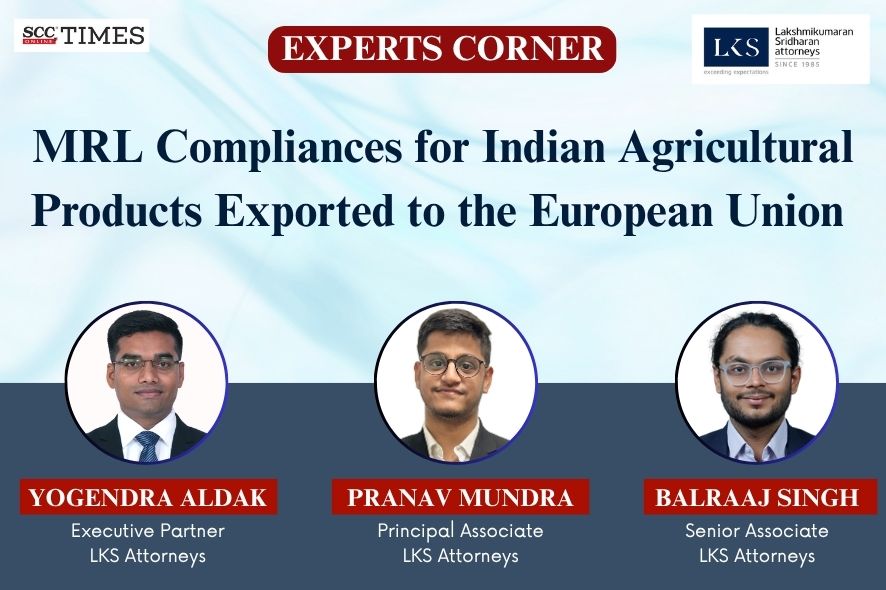MRL Compliances for Indian Agricultural Products Exported to the European Union

Introduction
In recent years, India has established itself as one of the leading exporters of agricultural products across the globe. With the advent of “organic” markets, the export economy is continuously growing at an exponential rate. Considering that the European Union (EU) is one of the leading importers of agricultural products from India, this article aims to summarise the applicable statutory and regulatory provisions with respect to food safety and compliance with contracts of sale-purchase and export of agricultural products from India to the EU.
The contracts executed for export of agricultural products for food purposes between the export houses established in India (exporters) and importers located in the EU (importers) may provide for applicable parameters and specifications for the consignment, quantity, payment terms, and even the governing law of the contract (sale contracts). “Considering that most sale contracts are issued by exporters, many of them expressly stipulate that they are governed by Indian laws
This article aims to analyse the legal compliances cast upon Indian exporters, in light of mandatory regulatory compliances of the importing country (EU), despite the contract being categorically governed by the laws of India i.e., the exporting country.
Applicable compliances under Indian laws
Considering that the governing law of such contracts is Indian, the primary legislations that would govern the terms of the contract would be: (i) the Contract Act, 18721 (Contract Act); and (ii) the Sale of Goods Act, 19302 (Rope).
Pertinently, the Indian law also provides for compliance of regulatory norms of the importing country. Section 163 of the Rope provides for implied warranties of fitness of goods for their intended purpose4as well as their merchantability. Thus, given that the purpose of the sale contracts is to procure agricultural products for food purposes in the EU, compliance with the requisite regulations pertaining to food safety in the EU becomes an implied warranty under the sale contracts.
Further, Indian courts have consistently followed and applied “Business Efficacy Test” (BET) in interpreting commercial contracts. BET may be invoked to read a term in an agreement or contract to achieve the intended results by the parties. It dictates that the law desires to give effect to such business efficacy to a commercial transaction as must have been intended at all events by both parties who are businessmen.5 Thus, given that the goods purchased by the importer would be used as food in EU, BET dictates that an exporter is required to comply with the regulatory norms of importing country since the parties to the sale contract would always have intended to procure a consignment in compliance with regulatory norms of EU otherwise the object and purpose of the contract vis-à-vis the importer, would be frustrated.
Additionally, merely because the sale contracts stipulate the governing law as the laws of India, the same would not oust the applicability of mandatory regulatory norms in the EU. The use of the goods procured from India in the importing foreign country shall at all times be subject to the laws of the importing country, and the same is also recognised by the laws of India.6 The courts have consistently observed both — the applicability of the laws of the destination country as well as the non-applicability of the laws of India on the products meant for export. Pertinently, the Supreme Court has permitted the export of drugs banned in India but not in certain foreign countries.7 Similarly, the Kerala High Court held that the provisions of the Prevention of Food Adulteration Act, 19548 are not applicable to foods meant for exports.9 The Bombay High Court also held that the provisions of the Drugs and Cosmetics Act, 194010 are only applicable to the drugs meant for domestic use and contravention thereof qua drugs meant for export is not actionable.11
Applicable EU regulations
It is pertinent to note that the EU provides for comprehensive legislation through multiple regulations governing various aspects of food safety. A few key regulations and compliances are discussed below.
Regulation (EC) No. 396/200512 directs the maximum residue limits (MRLs) for pesticides applicable to products of plant and animal origin to be used as fresh, processed and/or composite food or feed.13 Pertinently, the objective of the Regulation (EC) No. 396/2005 is to ensure that non-approved pesticide in excess quantities is not inadvertently ingested by the consumers. Thus, the Regulation stipulates that MRLs should be set at an appropriately low level to protect the consumer from the intake of unauthorised or excessive levels of pesticides residues.14 Regulation (EC) No. 396/200515 provides for an indicative list of food articles under Annex I upon which MRLs are applicable. Additionally, Annex II stipulates the MRLs of approved pesticides. Further, Annex V of the said Regulation prescribes the limit of determination (LOD) i.e., the lowest quantity of a pesticide that can be detected as the MRL value of non-approved and banned pesticides. In case the MRL of a product is not provided, a default value of 0.01 mg/kg is applicable as the relevant MRL for such a product.16
Here, it is also pertinent to note that the Regulation (EC) No. 396/2005 prohibits dilution/mixing in order to reduce the MRL levels of products covered under Annex I.17 However, in case of conversion of raw agricultural product (RAC) to a processed food product, the MRLs would be determined after factoring the “processing factor” as provided in Annex VI.18 Pertinently, as of now, Annex VI does not provide for any processing factor of any product. Thus, the MRLs prescribed for RACs under Annex II and Annex V are applicable to processed food products made from such RACs, on an as-is where-is basis.
The question with respect to the applicability of MRLs prescribed for RACs on processed food products/ingredients has been clarified in the Circular issued by the Spices Board of India. The same clarifies that while exporting the spices and spice products to the EU, both — spices and spice products should be compliant with the MRLs prescribed by EU laws.19 Even the EU authorities impose sanctions as well as Rapid Alert System for Food and Feed (RASFF) Alerts issued by the EU authorities with respect to processed food products.20
Regulation (EC) No. 396/2005 gets amended from time-to-time to provide for updated MRLs based on factors such as expiry of approval for use.
At the same time, Regulation (EC) No. 178/200221 puts an obligation on food business operators (including importers) to ensure that foods and feeds satisfy the requirements of food law which are relevant to their activities and shall verify that such requirements are met.22 Furthermore, all the producers involved in the production process, including importers of finished products, component part or any raw material, into the EU are liable for damage caused due to defectiveness in such products supplied by importers.23 Lastly, the EU can impose sanctions, extending to the suspension of imports from the exporting country, in case of import of food products which are not safe for human consumption as per the EU Regulations.24
Conclusion
It can thus be concluded that the consignments being exported to the EU under commercial contracts governed by Indian laws should be compliant with the regulatory norms of the EU, being the law of the destination country. Any inconsistencies or deficiencies in such compliance are bound to attract liability upon the importers as well as exporters. Consequently, giving liberty to the importers to reject such consignments at the port of the destination results in a contractual dispute between the exporter and the importer. In case of contractual disputes arising from such rejections, several factors become key for adjudication, inter alia — communication between the parties, warranties (if any) issued by the exporters, testing obligations upon the importers, type of sale — for instance, the threshold may vary in cases of sale by sample as opposed to sale by description.
*Executive Partner, Lakshmikumaran & Sridharan Attorneys.
**Principal Associate, Lakshmikumaran & Sridharan Attorneys.
***Senior Associate, Lakshmikumaran & Sridharan Attorneys.
3. Sale of Goods Act, 1930, S. 16.
4. Eternit Everest Ltd. v. CG abraham, 2003 SCC OnLine Ker 180.
5. Nabha Power Ltd. v. Punjab State Power Corpn. Ltd., (2018) 11 SCC 508.
6. Bayer Corpn. v. Union of India2017 SCC OnLine Del 7378.
7. Drug Action Forum v. Union of India, (1997) 9 SCC 609.
8. Prevention of Food Adulteration Act, 1954.
9. Food Inspector v. Good & Dholakia (P) Ltd., 1982 SCC OnLine Ker 70.
10. Drugs and Cosmetics Act, 1940.
11. State of Maharashtra v. Ghanshyam K. Zaveri2000 SCC OnLine Bom 748.
12. Maximum Residue Levels of Pesticides in or on Food and Feed of Plant and Animal Origin and Amending, Council Directive 91/414/EEC, Regulation (EC) No. 396/2005, 23-2-2005, available at
13. Regulation (EC) No. 396/2005, Arts. 2 and 4.
14. Regulation (EC) No. m396/2005, Recital (22).
15. Regulation (EC) No. 396/2005
16. Regulation (EC) No. 396/2005, Art. 18.
17. Regulation (EC) No. 396/2005, Art. 19.
18. Regulation (EC) No. 396/2005, Art. 20.
19. Ministry of Commerce & Industry, Spice Board, Circular No. 11/2021(Issued on 8-10-2021).
20. EURASFF Alert No. 2023.4145, 2023.6706, 2021.7101, etc.
21. General Principles and Requirements of Food Law, Establishing the European Food Safety Authority, Regulation (EC) No. 178/2002, 28-1-2002, available at
22. Regulation (EC) No. 178/2002, Art. 17.
23. Approximation of the Laws, Regulations and Administrative Provisions of the Member States Concerning Liability for Defective Products, Council Directive (85/374/EEC), 25-7-1985, available at
24. Regulation (EC) No. 178/2002, Arts. 53 and 54.

